While inaugurating the projects, Modi said highways construction has reached 27-km a day from mere 12-km a day during the Congress regime.
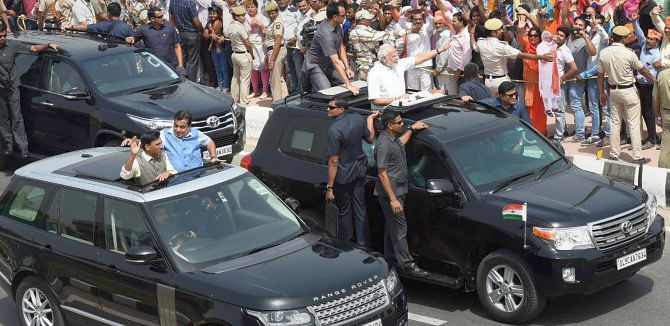
Asserting that infrastructure is a key priority for his government, Prime Minister Narendra Modi said on Sunday that Rs 3 lakh crore has been spent on laying a network of 28,000 km of highways.
Highways, railways, airways and I-ways have been the focus of the government, he said.
Highways construction has reached 27-km a day from mere 12-km a day during the Congress regime, while last year 10 crore people undertook air journeys, he said.
Modi was addressing a public rally after dedicating the Eastern Peripheral Expressway to the nation. The 135 km EPE has been built at a cost of Rs 11,000 crore in 500 days.
He said that apart from Rs 5 lakh crore provision for Bharatmala for highways, a provision of Rs 14 lakh crore was made in the budget to strengthen agriculture related infrastructure.
He further said that during the Congress regime optical fibre network was laid in only 59 gram panchayats, whereas the National Democratic Alliance within 4 years has laid the network in one lakh gram panchayats.
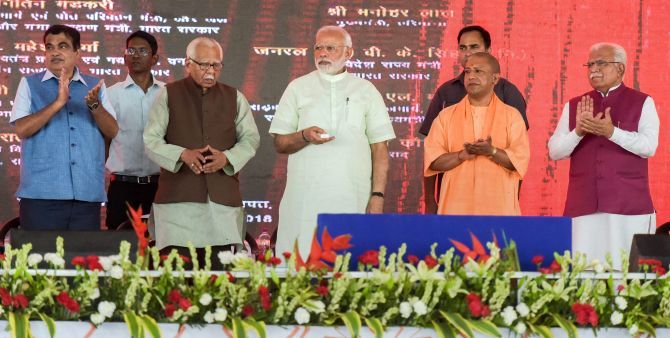
Modi said the government is sensitive to the plight of sugarcane farmers and adequate steps are being taken to provide proper prices for their crop.
While talking about social justice, Modi said his government is committed to the protection of Dalits and has constituted special courts for fast-track hearing of cases of atrocities.
He said that under the Yogi government, criminals in Uttar Pradesh are now surrendering themselves and pledging not to indulge in illegal acts.
In the field of women empowerment, said that toilets built under Swachh Bharat Mission, and LPG connections under Ujjwala Yojana are making the lives of women easier. He said that out of 13 crore loans given under Mudra Yojana, more than 75 per cent have been given to women entrepreneurs.
About the Ganga cleaning programme, Modi said more than 200 projects worth Rs 21,000 crore for have been taken up.
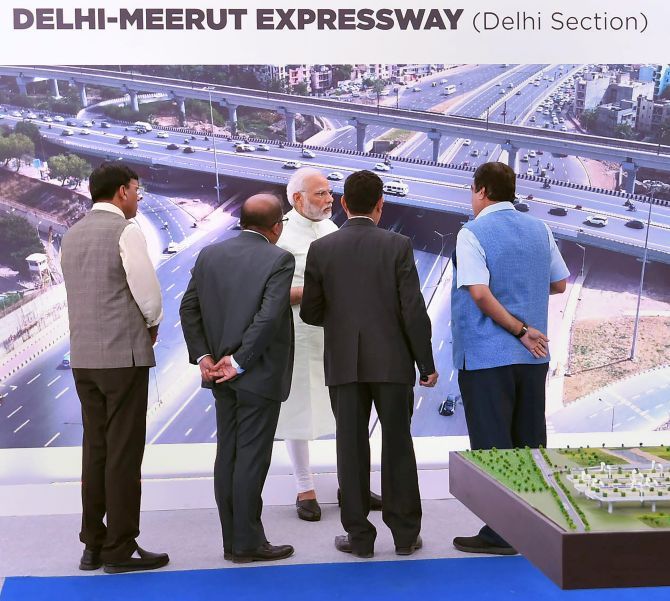
Taking a jibe at Congress, Modi said it had betrayed people and played politics to create a crisis of confidence whether related to EVMs or other critical issues.
In his about 50 minute-speech, the prime minister also mentioned the steps taken for Scheduled Castes and Other Backward Castes.
Road Transport, Highways and Shipping Minister Nitin Gadkari said, the expressway will reduce 27 per cent pollution and ease 41 per cent traffic jam.
Gadkari said the Delhi-Meerut expressway will be completed by next March and reduce the travel time between the two cities to 40 minutes.
A lot of traffic, outbound or non-destined for Delhi will be diverted, he has said, adding that at least 50,000 vehicles will be diverted.
The alignment of EPE starts near Kundli and passes through six Parliamentary Constituencies -- Sonepat, Bagpat, Gaziabad, Noida, Faridabad and Palwal.

Gadkari also announced that Delhi-Saharanpur Highway will be built on EPE pattern and foundation stone of the Rs 7,000 crore Dwarka Expressway will be launched soon by the PM.
Besides, he announced the Rs 45,000 crore Delhi-Mumbai project on a new alignment, which will save Rs 16,000 crore on land acquisition.
EPE is India’s first highway to be lit by solar power besides provisions of rain water harvesting every 500 metre on both sides. It also showcases 36 national monuments and 40 fountains.
There are eight solar power plants on this expressway having a capacity of 4000-kilo watt.
The state-of-the-art road has an auto challan system for over-speeding, as cameras will capture speed of vehicles besides having provisions of tolling only for the distance travelled. The expressway has an iconic toll plaza at the entry point on Kundli side besides digital art gallery.
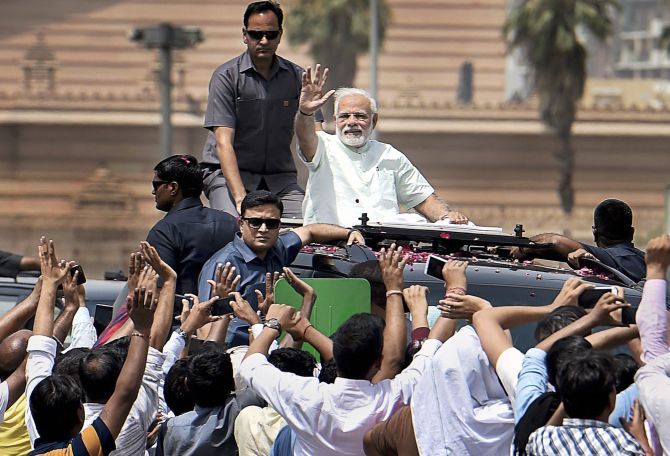
It is also equipped with smart and intelligent highway traffic management system and video incident detection system and is environment-friendly with world-class safety features and smart/ interactive infrastructure.
The foundation stone of the greenfield project was laid by Modi on November 5, 2015.
About 2.5 lakh trees have been planted alongside the expressways including transplant of 8-10 year old trees with drip irrigation system for plantation.
The fully access controlled six-lane expressway provides entry and exit designated interchanges only. It has 406 structures of which 4 are major bridges, 46 minor bridges, 3 flyovers, 7 inter-changes and 221 underpasses.
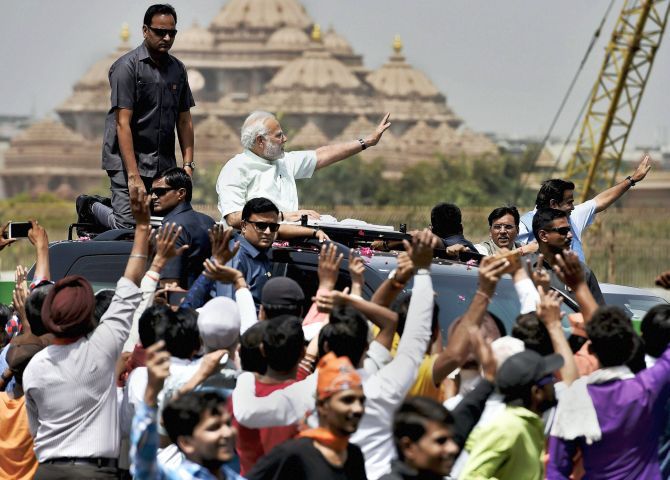
The Supreme Court on May 10 had directed the National Highways Authority Of India to throw open the Eastern Peripheral Expressway for the public by May 31, asking why were they “waiting” for its inauguration by the PM.
The apex court had said if the 135-km expressway is not inaugurated on or before May 31, it should be thrown open for the public to ease congestion.
The Eastern and the Western Peripheral Expressways were planned in 2006 following the apex court’s order to build a ring road outside the national capital.
Before inaugurating EPE, the PM launched the 14 lane, access controlled, Phase-I of the Rs 5,000 crore Delhi-Meerut Expressway, stretching from Nizamuddin Bridge to Delhi-UP Border.
The 14 lane expressway stretches 8.716 km and has been completed in a record 18 months as against scheduled 30 months.











 © 2025
© 2025